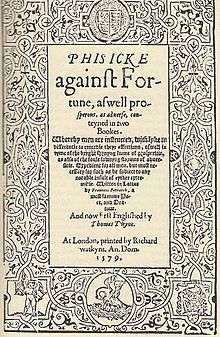De remediis utriusque fortunae

book cover of 1579
De remediis utriusque fortunae is a collection of 254 Latin dialogues written by the humanist Francesco Petrarca (1304-1374), commonly known as Petrarch.
The dialogues, completed towards the end of Petrarch's life, are treasure-chests of wisdom and humour which, despite the passing of six centuries, have not lost their relevance. They display remarkably lucid ideas that are cogently expressed. Drawing on classical sources, Petrarch expounded on refinement in taste and intellect, on finesse and propriety in speech and style.
The writing is a bouquet of moral philosophy, set out to show how thought and deed can generate happiness on the one hand, or sorrow and disillusionment on the other. In a recurring theme throughout the dialogues, Petrarch advises humility in prosperity and fortitude in adversity.[1]
The 254 woodcut illustrations by the anonymous Master of Petrarch for the 1532 German edition are considered masterpieces of the German Renaissance.
In 1579 the dialogues were translated into English by the Elizabethan physician Thomas Twyne (1543–1613) as Phisicke Against Fortune, and by Susannah Dobson in 1791 as Petrarch's View of Human Life.[2]
References
- ↑ http://colophon.com/foolscap/phis.html
- ↑ Antonella Braida, "Dobson , Susannah (d. 1795)", ODNB, Oxford University Press, 2004 Retrieved 7 October 2014, subscription required.
External links
| Wikiquote has quotations related to: De remediis utriusque fortunae |
![]() Media related to De remediis utriusque fortunae at Wikimedia Commons
Media related to De remediis utriusque fortunae at Wikimedia Commons
- De remediis utriusque fortunae, Cremonae, B. de Misintis ac Caesaris Parmensis, 1492. Online at Wikisource
- „Von der Artzney bayder Glück / des guoten vnd widerwertigen. Vnnd weß sich ain yeder inn Gelück vnnd vnglück halten sol. Auß dem Lateinischen in das Teütsch gezogen. Mit künstlichen fyguren durchauß / gantz lustig vnd schön gezyeret.“ Augsburg: Heynrich Steyner 1532. Online at gallica
- Catharina Ypes: Petrarca in de Nederlandse letterkunde. De Spieghel, Amsterdam 1934. Online at Digitale Bibliotheek voor de Nederlandse Letteren